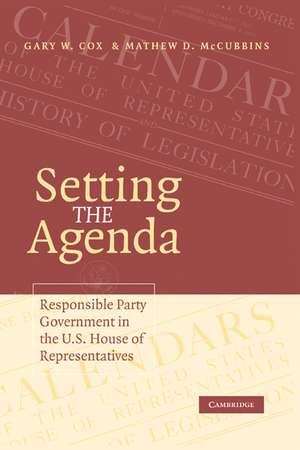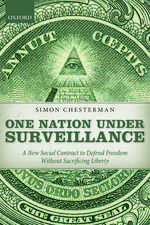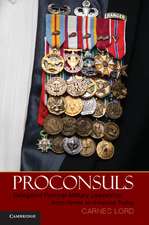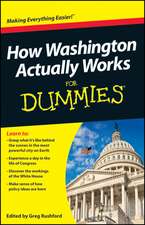Setting the Agenda: Responsible Party Government in the U.S. House of Representatives
Autor Gary W. Cox, Mathew D. McCubbinsen Limba Engleză Paperback – 11 sep 2005
| Toate formatele și edițiile | Preț | Express |
|---|---|---|
| Paperback (1) | 283.50 lei 6-8 săpt. | |
| Cambridge University Press – 11 sep 2005 | 283.50 lei 6-8 săpt. | |
| Hardback (1) | 479.59 lei 6-8 săpt. | |
| Cambridge University Press – 25 sep 2005 | 479.59 lei 6-8 săpt. |
Preț: 283.50 lei
Nou
Puncte Express: 425
Preț estimativ în valută:
54.25€ • 59.11$ • 45.71£
54.25€ • 59.11$ • 45.71£
Carte tipărită la comandă
Livrare economică 23 aprilie-07 mai
Preluare comenzi: 021 569.72.76
Specificații
ISBN-13: 9780521619967
ISBN-10: 0521619963
Pagini: 352
Ilustrații: 20 b/w illus. 21 tables
Dimensiuni: 160 x 235 x 20 mm
Greutate: 0.5 kg
Editura: Cambridge University Press
Colecția Cambridge University Press
Locul publicării:New York, United States
ISBN-10: 0521619963
Pagini: 352
Ilustrații: 20 b/w illus. 21 tables
Dimensiuni: 160 x 235 x 20 mm
Greutate: 0.5 kg
Editura: Cambridge University Press
Colecția Cambridge University Press
Locul publicării:New York, United States
Cuprins
1. Introduction; Part I. Why Party Government?: 2. Procedural Cartel theory; Part II. Negative Agenda Power: 3. Cartel agenda model vs. floor agenda model; 4. The primacy of Reed's rules in house organization; 5. Final passage votes; 6. The costs of agenda control; 7. The textbook congress and the committee on rules; 8. The bills reported from committee; 9. Which way does policy move?; Part III. The Consequences of Positive Agenda Power and Conditional Party Government: 10. Positive agenda power; 11. Conclusion.
Recenzii
"In this follow up to their previous work on congressional parties, Cox and McCubbins have made a major contribution to the scientific understanding of Congress. The theoretical argument is tightly reasoned and persuasive, and the evidence is extensive and convincing. Setting the Agenda will be widely adopted in courses and will shape the research agendas of other scholars for years to come." David Rohde, Michigan State University
"This is a majestic book on Congress. Cox and McCubbins provide a new approach to the most important questions in the field: Why is Congress organized as it is? What is the role of parties in Congress? What do congressional leaders do? What does the Rules Committee do? Moreover, this book seeks to reinterpret critical moments in congressional history, such as the Reed Rules in 1890 and the era of the so-called "textbook Congress" of the mid-twentieth century. This book succeeds on every dimension. Given the controversies in this literature, it will be read by every student of Congress." Barry Weingast, Stanford University
"Setting the Agenda is a remarkable achievement. It responds with impressive historical sweep to more than a decade of research on parties in Congress, and it significantly advances our theoretical understanding of why parties matter. This work will itself set the agenda for scholarship on Congress and its parties in the years to come." Sarah Binder, George Washington University
"Another Cox and McCubbins masterpiece. Building on the theory in Legislative Leviathan of why parties form, Setting the Agenda explains why and how parties matter. By controlling the agenda party leaders can stop policies their members do not like and can ensure party discipline by preventing votes on issues on which their members have conflicting opinions. This has implications beyond the US Congress, for understanding politics and policy-making in parliaments throughout the democratic world." Simon Hix, London School of Economics and Political Science
“Cox and McCubbins make a powerful case for viewing agenda control as a persistent and fundamental dimension of party influence in the modern U.S. Congress. Even readers who may not be persuaded that this mode of analysis captures the full range of contributions parties and leaders make to congressional politics will benefit from a close reading of this study.” – Randall Strahan, Emory University
"This is a majestic book on Congress. Cox and McCubbins provide a new approach to the most important questions in the field: Why is Congress organized as it is? What is the role of parties in Congress? What do congressional leaders do? What does the Rules Committee do? Moreover, this book seeks to reinterpret critical moments in congressional history, such as the Reed Rules in 1890 and the era of the so-called "textbook Congress" of the mid-twentieth century. This book succeeds on every dimension. Given the controversies in this literature, it will be read by every student of Congress." Barry Weingast, Stanford University
"Setting the Agenda is a remarkable achievement. It responds with impressive historical sweep to more than a decade of research on parties in Congress, and it significantly advances our theoretical understanding of why parties matter. This work will itself set the agenda for scholarship on Congress and its parties in the years to come." Sarah Binder, George Washington University
"Another Cox and McCubbins masterpiece. Building on the theory in Legislative Leviathan of why parties form, Setting the Agenda explains why and how parties matter. By controlling the agenda party leaders can stop policies their members do not like and can ensure party discipline by preventing votes on issues on which their members have conflicting opinions. This has implications beyond the US Congress, for understanding politics and policy-making in parliaments throughout the democratic world." Simon Hix, London School of Economics and Political Science
“Cox and McCubbins make a powerful case for viewing agenda control as a persistent and fundamental dimension of party influence in the modern U.S. Congress. Even readers who may not be persuaded that this mode of analysis captures the full range of contributions parties and leaders make to congressional politics will benefit from a close reading of this study.” – Randall Strahan, Emory University
Descriere
Demonstrates that the majority party seizes agenda control at nearly every stage of the legislative process.












